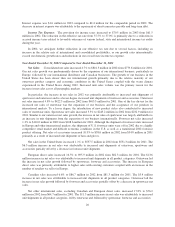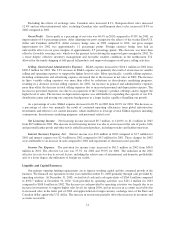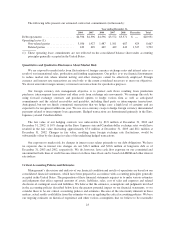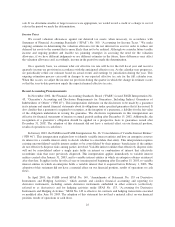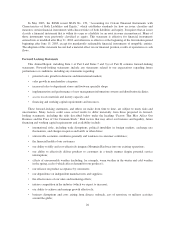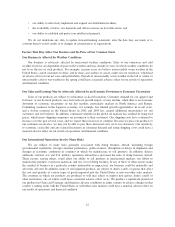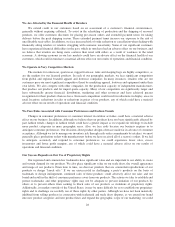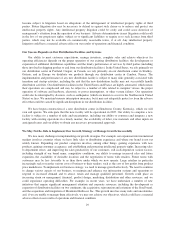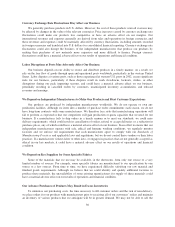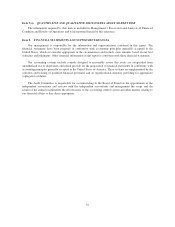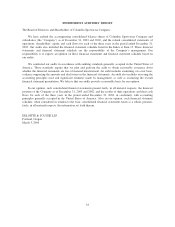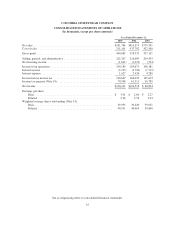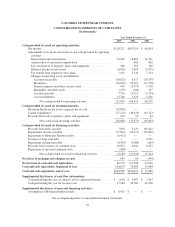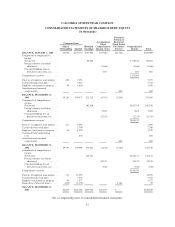Columbia Sportswear 2003 Annual Report Download - page 32
Download and view the complete annual report
Please find page 32 of the 2003 Columbia Sportswear annual report below. You can navigate through the pages in the report by either clicking on the pages listed below, or by using the keyword search tool below to find specific information within the annual report.• our ability to effectively implement and expand our distribution facilities;
• the availability of labor, raw materials and other resources on favorable terms; and
• our ability to establish and protect our intellectual property.
We do not undertake any duty to update forward-looking statements after the date they are made or to
conform them to actual results or to changes in circumstances or expectations.
Factors That May Affect Our Business and the Price of Our Common Stock
Our Business is Affected by Weather Conditions
Our business is adversely affected by unseasonal weather conditions. Sales of our outerwear and cold
weather footwear are dependent in part on the weather and may decline in years in which weather conditions do
not favor the use of such products. For example, in prior years we believe unseasonably warm weather in the
United States caused customers to delay, and in some cases reduce or cancel, orders for our outerwear, which had
an adverse effect on our net sales and profitability. Periods of unseasonably warm weather in the fall or winter or
unseasonably cold or wet weather in the spring could have a material adverse effect on our results of operations
and financial condition.
Our Sales and Earnings May be Adversely Affected by an Economic Downturn or Economic Uncertainty
Sales of our products are subject to substantial cyclical fluctuation. Consumer demand for our apparel and
footwear, or our licensed products, may not reach our growth targets, or may decline, when there is an economic
downturn or economic uncertainty in our key markets, particularly markets in North America and Europe.
Continuing weakness in the Japanese economy, for example, has limited growth opportunities in recent years,
and a slower economy in the United States in 2002 and 2003 has created additional uncertainties for our
customers and our business. In addition, continued volatility in the global oil markets has resulted in rising fuel
prices, which many shipping companies are passing on to their customers. Our shipping costs have continued to
increase over the past several years, and we expect these increases to continue. Because we price our products to
our customers in advance, we may not be able to pass these increased costs on to our customers. Our sensitivity
to economic cyclicality and any related fluctuation in consumer demand and rising shipping costs could have a
material adverse effect on our results of operations and financial condition.
Our International Operations Involve Many Risks
We are subject to many risks generally associated with doing business abroad, including foreign
governmental regulations, foreign consumer preferences, political unrest, disruptions or delays in shipments and
changes in economic conditions in countries in which we manufacture or sell products. In addition, disease
outbreaks, terrorist acts and U.S. military operations abroad have increased the risks of doing business abroad.
These factors, among others, could affect our ability to sell products in international markets, our ability to
manufacture products or procure materials, and our cost of doing business. If any of these or other factors make
the conduct of business in a particular country undesirable or impractical, our business could be materially and
adversely affected. In addition, many of our imported products are subject to duties, tariffs or quotas that affect
the cost and quantity of various types of goods imported into the United States or into our other sales markets.
The countries in which our products are produced or sold may adjust or impose new quotas, duties, tariffs or
other restrictions, any of which could have a material adverse effect on us. We produce a significant portion of
our products in China and Vietnam, and therefore adverse conditions in either country or adverse changes in that
country’s trading status with the United States or with other sales markets could have a material adverse effect on
our results of operations and financial condition.
27





